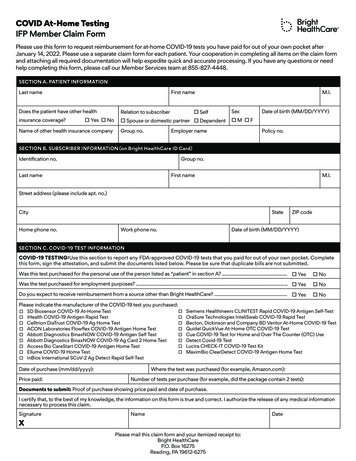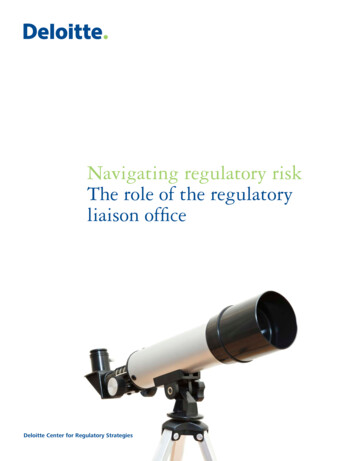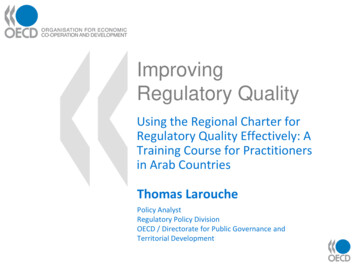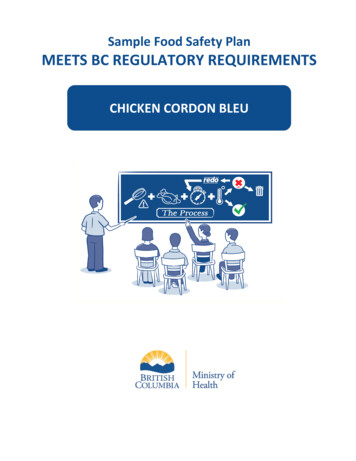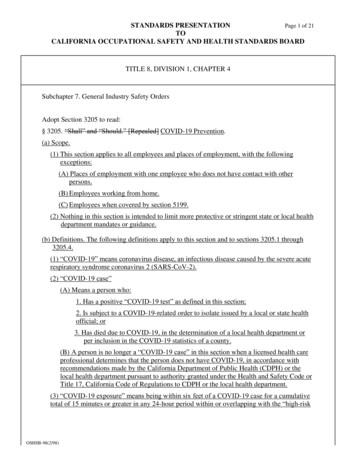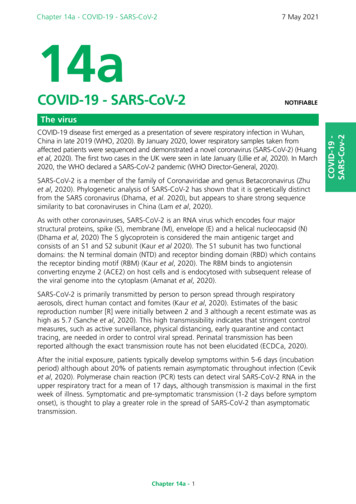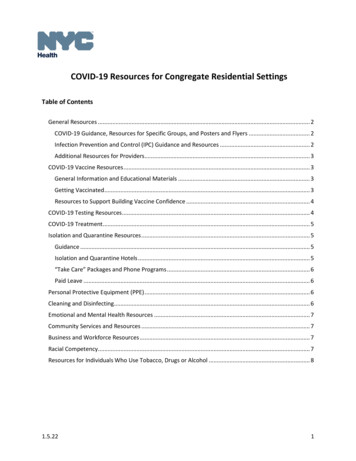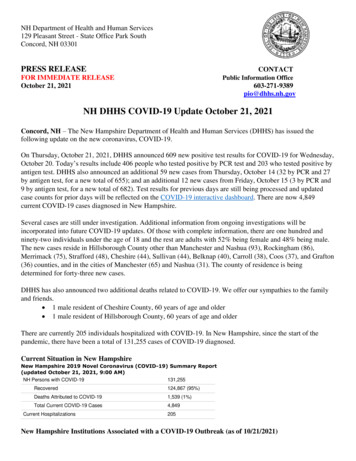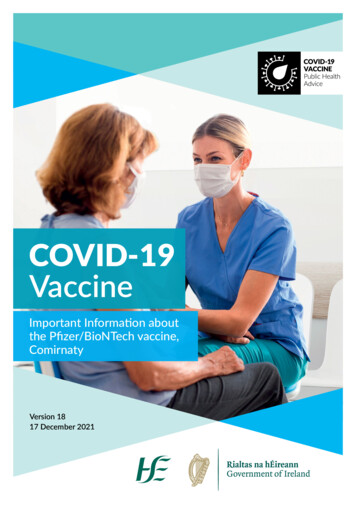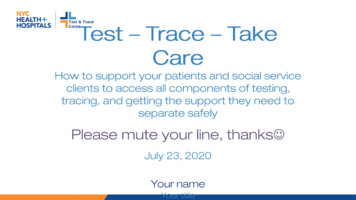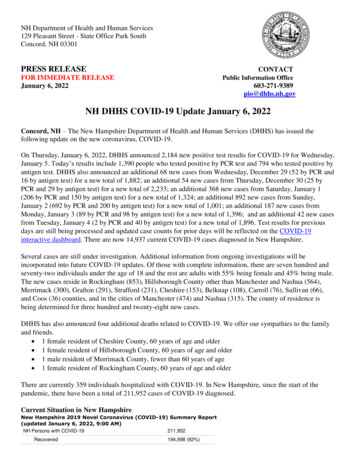
Transcription
MMHPI COVID-19 Regulatory & Reimbursement NewsletterLetter to Providers #3: State and Federal Updates – April 9, 2020With federal and state health care policies changing rapidly in response to COVID-19, theMeadows Mental Health Policy Institute (MMHPI) is issuing COVID-19 Regulatory &Reimbursement Newsletters to support providers as they navigate this new terrain. In thisnewsletter, we highlight several recent changes to regulatory and reimbursement rules. We willbe distributing these newsletters on a regular basis during the pandemic to provide informationon federal, state, and local regulatory and reimbursement changes.These newsletters, along with additional information on mental health resources during apandemic, are posted here: https://www.texasstateofmind.org/covid-19/.If you would like to have additional organizations added to our distribution list or have followup questions on the content, please email Catie Hilbelink at chilbelink@texasstateofmind.org.ContentsHHSC Behavioral Health Service Providers FAQs . 2Governor Waives Certain Regulations to Expand Health Care Workforce . 2Texas Medical Board FAQs Regarding Physician Supervision of Physician Assistants and AdvancePractice Registered Nurses . 3COVID-19 Response Recommendations: Substance Use and Misuse Prevention . 3Clarification to Texas Medicaid & Healthcare Partnership’s “COVID-19 Guidance: Targeted CaseManagement Through Remote Delivery”. 4Admission to Texas State Supported Living Centers and State Hospitals . 4Update to Guidance for FFS Service Coordinators and Case Managers . 5Temporary Change in Home and Community-based Services Texas Home Living Policy forService Providers of Respite and Community First Choice Personal AssistanceServices/Habilitation . 5Medicare Coverage and Payment of Virtual Services. 6Coronavirus Relief Fund in the Federal CARES Act . 6Guidance for Enrolling Ambulatory Surgical Centers (ASCs) Temporarily as Hospitals during theCOVID-19 Public Health Emergency . 7Policing in a Pandemic: A Virtual Peer Support Series . 7
MMHPI COVID-19 Regulatory & Reimbursement Newsletter #3 – April 9, 2020HHSC Behavioral Health Service Providers FAQsDateApril 7, 2020SummaryThe Texas Health and Human Services Commission (HHSC) is working to provideguidance and support throughout this pandemic. They have received a variety ofinquiries from providers and are working diligently to address concerns. HHSCBehavioral Health Services is maintaining a COVID-19 Provider Issues ManagementLog, and this frequently asked questions (FAQ) document serves as a platform torespond to provider questions. This is a living document and will be updated andposted weekly.The file includes sections on “what we know today” for mental health services,substance use disorder services, substance use prevention services, recovery supportservices, OSAR centers, opioid treatment providers and Medicaid services. It alsoanswers questions in the following categories: general questions, shelter-in-place,residential services, contracts, telehealth, service modifications and considerations,Clinical Management for Behavioral Health Services (CMBHS) and Mental Retardationand Behavioral Health Outpatient Data Warehouse (MBOW), and substance useprevention rvices-covid-faq.pdfGovernor Waives Certain Regulations to Expand Health Care WorkforceDateApril 5, 2020SummaryGovernor Abbott has temporarily waived certain regulations to expand the healthcare workforce to assist with Texas' COVID-19 response. Under this waiver, PhysicianAssistants (PA), Medical Physicists, Perfusionists, and Respiratory Care candidates forlicensure who have completed all other requirements may enter the workforce underan emergency license working under supervision prior to taking the final licensureexamination. The Governor's waiver also provides for emergency licensees toundergo name-based background checks in place of fingerprint checks whilefingerprint checks are unavailable due to the crisis. Additionally, the Governor'swaiver allows more flexibility between physicians and the PAs and Advance PracticeRegistered Nurses they supervise including allowing for oral prescriptive delegationagreements to enable rapid deployment of those practitioners during the alth-care-workforce-during-covid-19-response2
MMHPI COVID-19 Regulatory & Reimbursement Newsletter #3 – April 9, 2020Texas Medical Board FAQs Regarding Physician Supervision of PhysicianAssistants and Advance Practice Registered NursesDateApril 7, 2020SummaryThe Texas Medical Board (TMB) posted FAQs on the Governor’s waiver of certain lawsand rules related to the supervision of physician assistants and advanced practiceregistered nurses. For the duration of the disaster, the limit on the number ofprescriptive delegates has been lifted and supervisory relationships do not need to bein writing or registered with the TMB. Verbal agreement between a physician anddelegate is sufficient to establish and maintain the relationship. The supervisingphysician does not have to be at the same location as the delegate, but a supervisingphysician must be available to answer questions and provide assistance to thedelegates as needed. Telecommunication must always be BEE-651C-791B-0A6C-96C0072E907ECOVID-19 Response Recommendations: Substance Use and Misuse PreventionDateApril 3, 2020SummaryHHSC realizes that substance use and misuse prevention programs are deeply rootedin communities across Texas. As public health concerns increase, it is incumbentupon HHSC to provide guidance to ensure the safety of the prevention workforceand the community in which your organization provides services. HHSC wishes toremain vigilant in the support of substance use and misuse prevention programs andfeels it is imperative that it suspends required contractual performance measuresuntil the COVID-19 crisis can be further evaluated and the threat to public health ismitigated.This file outlines related impacts, expectations, and recommendations of HHSCregarding substance use and misuse prevention programs including YouthPrevention Indicated (YPI), Youth Prevention Selective (YPS), Youth PreventionUniversal (YPU), Community Coalition Partnerships (CCP), Prevention ResourceCenters (PRC), and Strategic Prevention Framework-Partnerships for Success (SPFPFS) programs. While HHSC is making recommendations on specific performancemeasures, it is up to the organization to identify ways their workforce can continueto reach and impact the community in other areas, if the organization has thecapacity to do ntion-contract-guidance.pdf3
MMHPI COVID-19 Regulatory & Reimbursement Newsletter #3 – April 9, 2020Clarification to Texas Medicaid & Healthcare Partnership’s “COVID-19Guidance: Targeted Case Management Through Remote Delivery”DateApril 2, 2020SummaryThis is a clarification to the guidance titled, “COVID-19 Guidance: Targeted CaseManagement Through Remote Delivery,” which was posted on Texas Medicaid &Healthcare Partnership’s (TMHP’s) website on April 1, 2020. To clarify, Targeted CaseManagement through remote delivery utilizing modifier 95 does not apply tointellectual or developmental disability (IDD) case management providers.Linkhttp://www.tmhp.com/News dfAdmission to Texas State Supported Living Centers and State HospitalsDateApril 2, 2020SummaryHHSC is pausing admissions at state supported living centers. State supported livingcenters have significant populations who are medically fragile and at an extremelyhigh-risk in the event of an outbreak. HHSC will continue to accept inquiries andpackets for future admissions, and those will be placed on a waiting list at this time.HHSC will evaluate this plan at the end of April.State hospitals will continue to take new patients at this time. Because of the uniquechallenges created by COVID-19, the state hospitals will need to create space toisolate patients. This means they cannot operate at full capacity. HHSC will workclosely with local mental health authorities to prioritize emergency civil admissionswhere there is no adequate community inpatient resource available, to ensure theywill have access to the help they need. Priority will be given next to patients frommaximum-security units in Vernon and Rusk to transfer to other state hospitals whenthe patients are determined to not be manifestly net/portals/0/Issues/Emergency%20Readiness/Notice of Admissions Changes.pdf?sr b&si DNNFileManagerPolicy&sig ixk%3D4
MMHPI COVID-19 Regulatory & Reimbursement Newsletter #3 – April 9, 20205Update to Guidance for FFS Service Coordinators and Case ManagersDateApril 2, 2020SummaryFee-for-service (FFS) Medicaid 1915(c) waiver case managers and servicecoordinators may continue to suspend face-to-face service coordination visits. This isthrough April 30, 2020 and applies to: Community Living Assistance and Support ServicesTexas Home LivingDeaf-Blind with Multiple DisabilitiesHome and Community-based ServicesGeneral Revenue Service CoordinatorsCommunity First Choice Service CoordinatorsPre-admission Screening and Resident Review Habilitation CoordinatorsDue to COVID-19, HHSC encourages case managers, service coordinators, andhabilitation coordinators to complete visits due through April 30, 2020 by phone,telehealth or telemedicine, if y Change in Home and Community-based Services Texas Home LivingPolicy for Service Providers of Respite and Community First Choice PersonalAssistance Services/HabilitationDateApril 6, 2020SummaryHome and Community-based Services (HCS) and Texas Home Living (TxHmL) BillingGuidelines Section 4660(1) and CFC Billing Guidelines Section 3710(a)(1) prohibit aperson from receiving respite or Community First Choice (CFC) Personal AttendantServices/Habilitation (PAS/HAB) from someone who lives in the same home as theperson. HHSC is lifting the prohibition on service providers of respite and CFCPAS/HAB from living in the same home as the person receiving Home andCommunity-based Services and Texas Home Living program services.This is to provide access to needed services for people living in their own home orfamily’s home. An individual’s spouse or the parent of a minor child is still prohibitedfrom being a paid service provider of these services. This policy change is effectiveMarch 27 through April 30, 2020. Program providers must complete the requiredbackground checks for all service providers.
MMHPI COVID-19 Regulatory & Reimbursement Newsletter #3 – April 9, re Coverage and Payment of Virtual ServicesDateApril 3, 2020SummaryThe Centers for Medicare and Medicaid Services (CMS) released a video(approximately 15 minutes) providing answers to common questions about theMedicare telehealth services benefit. CMS is expanding this benefit on a temporaryand emergency basis under the 1135 waiver authority and Coronavirus Preparednessand Response Supplemental Appropriations Act.Linkhttps://youtu.be/bdb9NKtybzoCoronavirus Relief Fund in the Federal CARES ActDateApril 1, 2020SummaryA 150B Coronavirus Relief Fund is included in the CARES Act. Of the 150B, 139B isallocated to state governments in the 50 states, with allocations based on populationand no state receiving less than 1.25B. Texas expects to receive a little over 11.2B.The money allows state and local governments to make payments for programs that:1) Are necessary expenditures incurred due to the COVID-19 emergency;2) Were not accounted for in the budget most recently approved as of March27, 2020 for the state or local government; and3) Are incurred from March 1, 2020 to December 30, 2020.Fund assistance is generally provided directly to state governments. However, localgovernments serving a population of at least 500,000 may elect to receive fundsdirectly from Treasury (which reduces the state allocation). The feds project this to beavailable to 12 counties in Texas, totaling 3.2B. The county judge must send a signedcertification to Secretary Mnuchin to get direct funds.Payments are due from the Treasury not later than 30 days after enactment of theCARES Act, which should be April /R/R462986
MMHPI COVID-19 Regulatory & Reimbursement Newsletter #3 – April 9, 20207Guidance for Enrolling Ambulatory Surgical Centers (ASCs) Temporarily asHospitals during the COVID-19 Public Health EmergencyDateApril 3, 2020SummaryDuring the COVID-19 PHE, CMS is allowing all Medicare-enrolled Ambulatory SurgicalCenters (ASCs) to enroll as hospitals and provide inpatient and outpatient hospitalservices to help address the urgent need to increase hospital capacity to take care ofpatients. Any Medicare-certified ASC wishing to enroll as a hospital during the COVID19 PHE should notify the Medicare Administrative Contractor (MAC) that serves theirjurisdiction of its intent by calling the MAC’s provider enrollment hotline andfollowing the instructions noted in the 2019-Novel Coronavirus (COVID-19) MedicareProvider Enrollment Relief Frequently Asked Questions (FAQs) orarily-enrollinghospitalsPolicing in a Pandemic: A Virtual Peer Support SeriesThe Meadows Mental Health Policy Institute (MMHPI) and Caruth Police Institute (CPI)recognize that the COVID-19 pandemic represents one of the biggest policing challenges inmodern times. At a time when the public is taking measures to protect family and loved onesfrom exposure to the Coronavirus, first responders face the uncertainty of community exposureand in turn the fear of exposing their loved ones. In addition, first responders are facingincreased workloads as they adapt to policing and emergency response models in apandemic. This compounds the dynamic nature of first responder stress and fatigue at a timehealth, wellness, and resiliency are more critical than ever. To provide an immediate resourceto first responders, we have established the Policing in Pandemic Virtual Peer NetworkingSeries. MMHPI and CPI will host four weekly interactive online events including nationallyrecognized peer specialists, health and wellness experts, and first responder wellness providersin a digital platform that provides anonymity to officers to join online, share experiences, hearfrom their peers, and get real time resources to address the impact of this new normal.April 9:April 16:April 23:April 30:That Peer Support Couple22Kill CEO Tempa SherrillBlue HELP founder Steven HoughPERF Executive Board Member, CPI Executive Board Chair, and Irving Police Chief Jeff Spiveyjoined by Chief Greg Stevens of Rockport Police DepartmentAll of the events are at 6:00 PM CST. Please join us at: https://zoom.us/j/806383664.(The same zoom link will be used for the entire series.)
in writing or registered with the TMB. Verbal agreement between a physician and delegate is sufficient to establish and maintain the relationship. The supervising physician does not have to be at the same location as the delegate, but a supervising physician must be available to answer questions and provide assistance to the delegates as needed.
